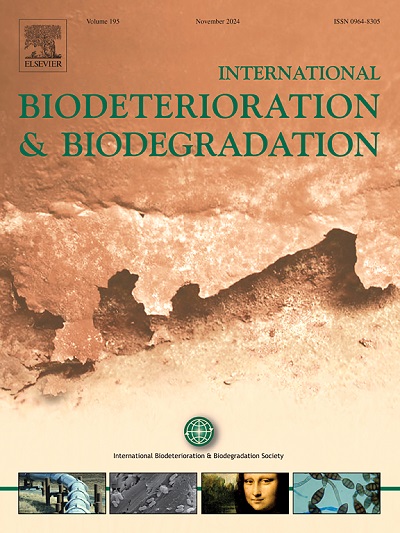Comparative studies on the effectiveness of proteases and enzymes from dietary supplements in the degradation of polylactide (PLA)
IF 4.1
2区 环境科学与生态学
Q2 BIOTECHNOLOGY & APPLIED MICROBIOLOGY
International Biodeterioration & Biodegradation
Pub Date : 2024-11-10
DOI:10.1016/j.ibiod.2024.105950
引用次数: 0
Abstract
Polylactide (PLA) has become one of the most widely used biodegradable plastics in recent years. The research focuses on solving the problem of its low-rate biodegradability under mesophilic conditions using cost-effective proteases of alternative origin. The aim of the study was to verify whether enzymes contained in food dietary supplements with the suggested high activity of protease enzymes could potentially be used for the degradation of PLA. The studies compare the activity of enzymes from dietary supplements with hydrolytic enzymes with scientifically proven effectiveness in degrading PLA. Products containing nattokinase, bromelain, papain and an enzyme mixture were tested. Their effectiveness against proteinase K, subtilisin and lipase was compared. From this group, proteinase K caused the greatest PLA mass loss and increase in O/C ratio after 28 days of incubation. The results indicated that nattokinase and papain caused a mass loss of PLA films similar to that of proteinase K, as well as a decrease in the carbonyl index value by more than 20%. Additionally, studies have shown that dietary supplements have a beneficial effect on the compost microflora. Causing an approximately 20-fold increase in the number of microorganisms within 48 h. In accordance with the assumptions, enzymatic products and their concentrations were selected that effectively accelerate PLA degradation in mesophilic conditions at a level comparable to or better than proteinase K, but have a much better effect on the substrate microflora, which makes them an interesting object for the development of products for accelerating the degradation of polymeric materials. In order to confirm the possibility of practical use of the results, an analysis of the phytotoxicity of the enzymes was carried out, which confirmed the possibility of using the enzymes in natural conditions.
蛋白酶和膳食补充剂中的酶在降解聚乳酸(PLA)中的效果比较研究
聚乳酸(PLA)是近年来应用最广泛的生物降解塑料之一。这项研究的重点是利用具有成本效益的替代来源蛋白酶,解决聚乳酸在中温条件下生物降解率低的问题。研究的目的是验证食品膳食补充剂中所含的酶是否具有蛋白酶的高活性,是否有可能用于降解聚乳酸。研究将膳食补充剂中的酶的活性与经科学证明可有效降解聚乳酸的水解酶进行了比较。对含有纳豆激酶、菠萝蛋白酶、木瓜蛋白酶和酶混合物的产品进行了测试。比较了它们对蛋白酶 K、枯草酶和脂肪酶的功效。在这组产品中,蛋白酶 K 在培养 28 天后造成的聚乳酸质量损失和 O/C 比率增加最大。结果表明,纳豆激酶和木瓜蛋白酶造成的聚乳酸薄膜质量损失与蛋白酶 K 相似,羰基指数值下降了 20% 以上。此外,研究还表明,膳食补充剂对堆肥微生物区系有好处。根据上述假设,我们选择了酶制剂产品及其浓度,它们能有效加速聚乳酸在中温条件下的降解,其降解效果与蛋白酶 K 相当或更好,但对底物微生物群的影响要大得多,这使它们成为开发加速高分子材料降解产品的有趣对象。为了证实这些结果的实际应用可能性,对酶的植物毒性进行了分析,证实了在自然条件下使用酶的可能性。
本文章由计算机程序翻译,如有差异,请以英文原文为准。
求助全文
约1分钟内获得全文
求助全文
来源期刊
CiteScore
9.60
自引率
10.40%
发文量
107
审稿时长
21 days
期刊介绍:
International Biodeterioration and Biodegradation publishes original research papers and reviews on the biological causes of deterioration or degradation.

 求助内容:
求助内容: 应助结果提醒方式:
应助结果提醒方式:


